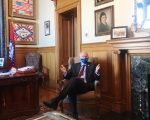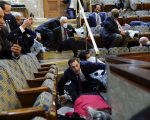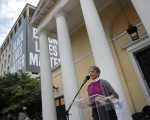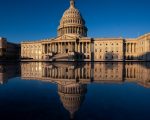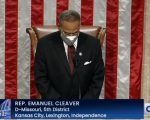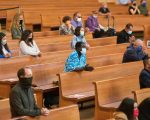Southern Baptist Ethicist Russell Moore to Trump: Resign
Russell Moore, president of the Southern Baptist Convention’s Ethics and Religious Liberty Commission and an outspoken Never Trumper, called for the president to leave after the insurrection at the U.S. Capitol.
Effort in Arkansas to Enact Hate Crimes Law in Jeopardy
A push to finally enact a hate crimes law in Arkansas, a state with a history of white supremacists, appeared to have all the elements for success: a popular Republican governor who made it a priority, major corporations endorsing the idea, and support from communities where hate groups have flourished.
Even After Insurrection, Pro-Trump Prayer Meeting Filled with Calls for a Trump ‘Miracle’
An online pro-Trump prayer meeting was filled with defiance on Wednesday night (Jan. 6), even as evangelical and charismatic supporters of President Donald Trump admitted that chances the election will be overturned were slim.
As Chaos Hits Capitol, Two Forms of Faith on Display
On Wednesday morning, an interfaith group of religious leaders gathered outside of Luther Place Memorial Church in the nation’s capital. Later that day, a pro-Trump mob attacked the U.S. Capitol, with some carrying Christian symbols.
Warnock Makes History with Senate Win
Democrat Raphael Warnock, a Black Baptist pastor, won one of Georgia’s two Senate runoffs, becoming the first Black senator in his state’s history and putting the Senate majority within the party’s reach.
Faith Leaders Urge Congress to Honor Election Result
More than 2,000 faith leaders and religious activists are calling on members of Congress to honor the result of November’s election and avoid “a delayed and drawn out objection” this week when President-elect Joe Biden’s win is set to be certified.
117th Congress, Like the Old, is Overwhelmingly Christian, Heavily Protestant
The religious composition of the new U.S. Congress that started Sunday remained overwhelmingly Christian (88%), and heavily Protestant (55%), the Pew Research Center has found.
‘Jericho March’ to Pray Pence will Overturn Election
A die-hard group of Trump supporters hopes 2021 will start with prayer, fasting, and perhaps a miracle. Organizers of the Jericho March have called on “patriots, people of faith, and all those who want to take back America” to travel to D.C. for a pair of marches to overturn the 2020 presidential election.
‘Amen & Awomen’? Congressional Prayer Joins Gendered Language Controversy
As the new session of the U.S. House of Representatives opened Sunday (Jan. 3),a prayer by Rep. Emanuel Cleaver, a Democrat from Missouri, sparked social media backlash and mocking.
Indoor Worship Now Allowed in LA County, but Some Churches Waiting
Churches in the most-populous county in the U.S. can now meet in person for worship because of changes in legal and political decisions. But with the pandemic still raging, many congregations continue to meet virtually.


